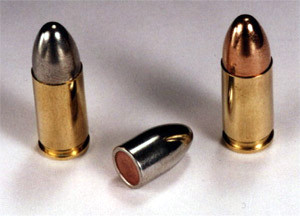9×19mm Parabellum
| 9×19mm Parabellum | ||||||||||||||||||||||||
|---|---|---|---|---|---|---|---|---|---|---|---|---|---|---|---|---|---|---|---|---|---|---|---|---|

9×19mm Parabellum rounds and a bullet for comparison
|
||||||||||||||||||||||||
| Type | Pistol | |||||||||||||||||||||||
| Place of origin | German Empire | |||||||||||||||||||||||
| Service history | ||||||||||||||||||||||||
| Used by | NATO and others | |||||||||||||||||||||||
| Wars | World War I – present | |||||||||||||||||||||||
| Production history | ||||||||||||||||||||||||
| Designer | Georg Luger | |||||||||||||||||||||||
| Designed | 1901 | |||||||||||||||||||||||
| Produced | 1902–present | |||||||||||||||||||||||
| Variants | 9mm NATO m/39B 9×19mm Parabellum +P 9×19mm 7N21 +P+ 9×19mm 7N31 +P+ |
|||||||||||||||||||||||
| Specifications | ||||||||||||||||||||||||
| Parent case | 7.65×21mm Parabellum | |||||||||||||||||||||||
| Case type | Rimless, tapered | |||||||||||||||||||||||
| Bullet diameter | 9.01 mm (0.355 in) | |||||||||||||||||||||||
| Neck diameter | 9.65 mm (0.380 in) | |||||||||||||||||||||||
| Base diameter | 9.93 mm (0.391 in) | |||||||||||||||||||||||
| Rim diameter | 9.96 mm (0.392 in) | |||||||||||||||||||||||
| Rim thickness | 1.27 mm (0.050 in) | |||||||||||||||||||||||
| Case length | 19.15 mm (0.754 in) | |||||||||||||||||||||||
| Overall length | 29.69 mm (1.169 in) | |||||||||||||||||||||||
| Case capacity | 0.862 cm3 (13.30 gr H2O) | |||||||||||||||||||||||
| Primer type | Berdan or Boxer small pistol | |||||||||||||||||||||||
| Maximum pressure (C.I.P.) | 235.00 MPa (34,084 psi) | |||||||||||||||||||||||
| Maximum pressure (SAAMI) | 241.32 MPa (35,001 psi) | |||||||||||||||||||||||
| Ballistic performance | ||||||||||||||||||||||||
|
||||||||||||||||||||||||
|
Test barrel length: Tests 1,2&3: 150mm(5.91in) / Tests 4&5: 118mm(4.65in) Source(s): Sellier & Bellot, Buffalo Bore,C.I.P., Cor-Bon |
||||||||||||||||||||||||
The 9×19mm Parabellum, also known as 9 x 19mm NATO, and 9mm Luger (abbreviated 9mm, 9mmP, 9×19mm or 9×19), is a cartridge that was designed by Georg Luger and introduced in 1902 by the German weapons manufacturer Deutsche Waffen und Munitionsfabriken (DWM) (German Weapons and Munitions Factory) for their Luger semi-automatic pistol. For this reason, it is designated as the 9mm Luger by the SAAMI and the 9 mm Luger by the C.I.P. Under STANAG 4090, it is a standard cartridge for NATO forces as well as many non-NATO countries.
The name Parabellum is derived from the Latin: Si vis pacem, para bellum ("If you seek peace, prepare for war"), which was the motto of DWM.
According to the 2014 edition of Cartridges of the World, the 9×19mm Parabellum is "the world's most popular and widely used military handgun and submachinegun cartridge." In addition to being used by over 60% of police in the U.S., Newsweek credits 9×19mm Parabellum pistol sales with making semiautomatic pistols more popular than revolvers. The popularity of this cartridge can be attributed to the widely held conviction that it is effective in police and self-defense use. Its low cost and wide availability contribute to the caliber's continuing popularity.
Georg Luger developed the 9×19mm Parabellum cartridge from his earlier 7.65×21mm Parabellum round, which itself was derived from the original 7.65×25mm Borchardt cartridge in the Borchardt C-93 pistol. Shortening the length of the cartridge case used in the Borchardt pistol allowed him to improve the design of the toggle lock and to incorporate a smaller, angled grip. Luger's work on the Borchardt design evolved into the Luger pistol, first patented in 1898 and chambered in 7.65×21mm Parabellum. Demand from Germany for a larger caliber in their military sidearm led Luger to develop the 9×19mm Parabellum cartridge for the eventual P08 pistol. This was achieved by removing the bottleneck shape of the 7.65×21mm Parabellum case, resulting in a tapered rimless cartridge encasing a bullet that was 9 mm in diameter.
...
Wikipedia
